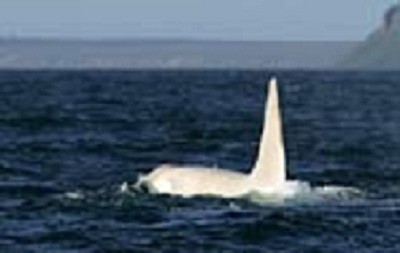White Killer Whale Discovered by Russian Scientists off Kamchatka
Russian scientists have made what they believe to be the first sighting of an adult white orca, or killer whale.
Researchers from the universities of Moscow and Saint Petersburg said they first spotted the orca near the Commander Islands in the North Pacific in August 2010, after spotting its two-metre dorsal fin.
They have named it Iceberg.
The orca, an adult male thought to be at least 16 years old, lives in a pod with 12 other family members, said Erich Hoyt, co-director of the Far East Russia Orca Project.
"This is the first time we have ever seen an all-white, mature male orca," Hoyt told AFP. "It is a breathtakingly beautiful animal."
The scientists were reluctant to release pictures of the orca until they were able to study him further, "but we have been looking for him ever since," Hoyt said.
While white whales of different species are occasionally spotted, the only white orcas spotted have been young.
In 1970, a two-year-old white orca, Chimo, was captured in Canada, but died two years later and was diagnosed with a type of albinism.
Now scientists will try to establish whether Iceberg is albino, a genetic condition that leaves animals unable to produce melanin, a dark pigment of skin, hair and the eye's retina and iris, AFP reported.
Many albino animals never grow into adulthood. Since they are easier to see, they are easier for a predator to catch. Their visibility also makes their hunt for food more difficult.
Two other while orcas are known to live in the same waters as Iceberg, but they are juveniles.
"We want to find out a lot more about Iceberg," Hoyt said. "We would like to find out how he is able to survive as a white whale."




© Copyright IBTimes 2025. All rights reserved.





















